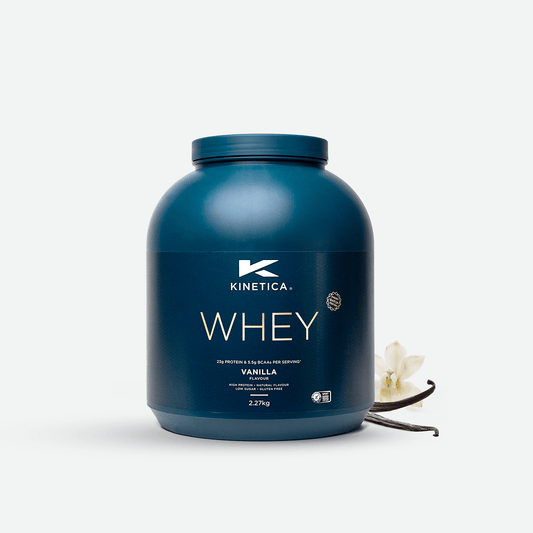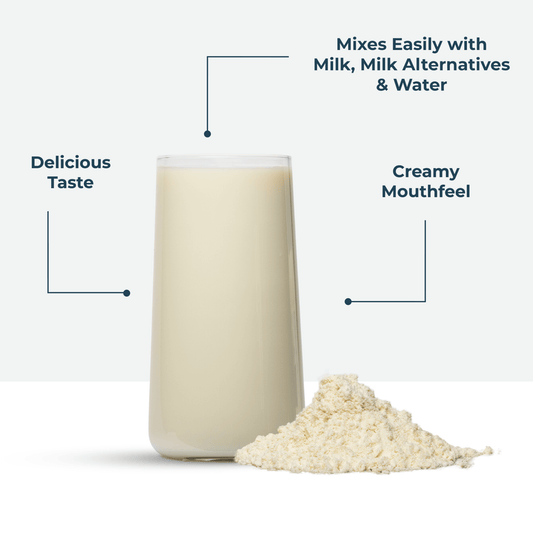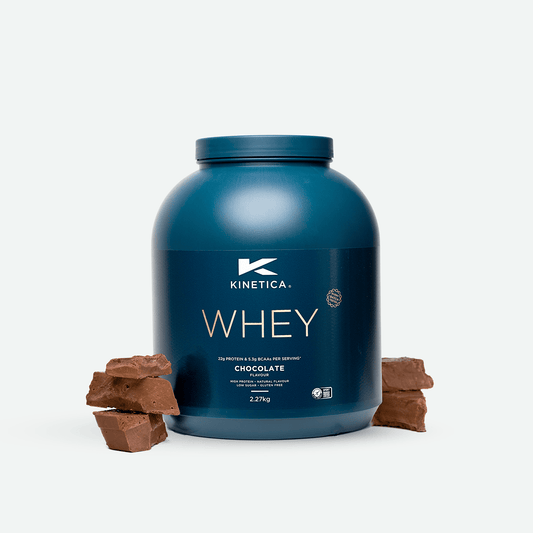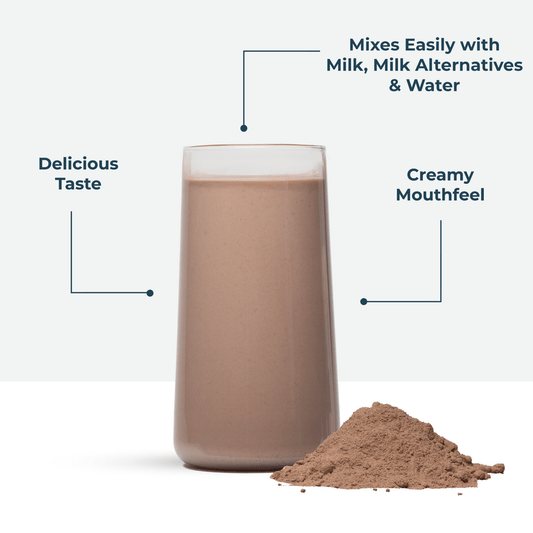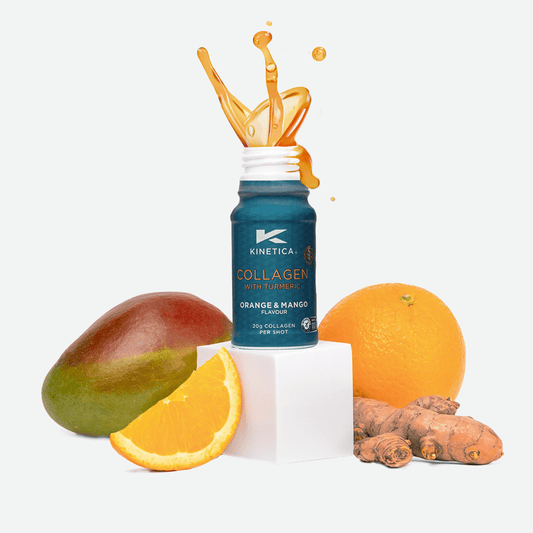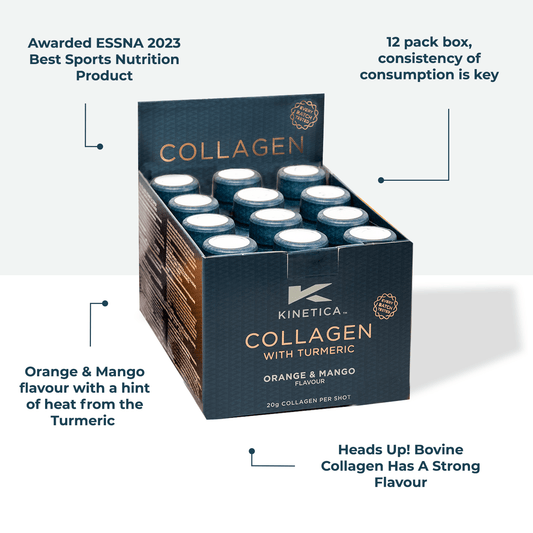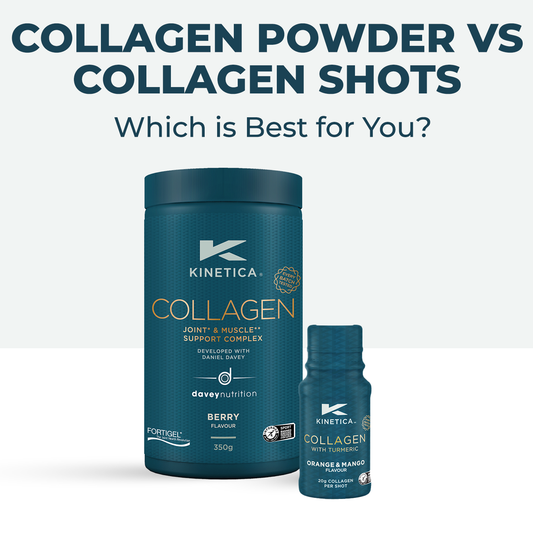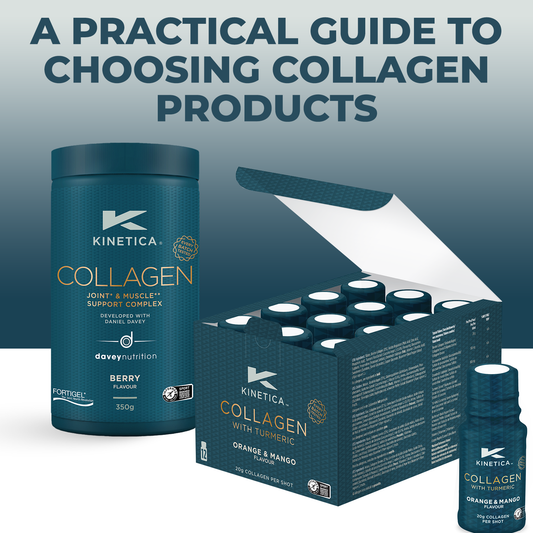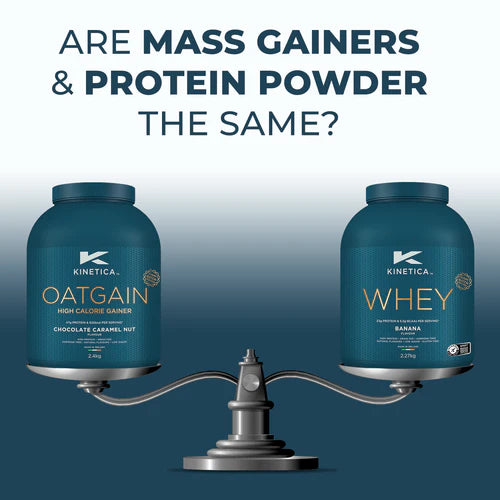Why should women take creatine?
Content you'll find:
1. What is creatine?
2. How should you take creatine?
3. Why should women take creatine?
4. What are the benefits of creatine to women?
5. How much creatine should a women consume?
Creatine is a popular supplement in men’s fitness, so if you equate creatine with guys lifting heavy in the strength section of the gym, you are not alone.
However, creatine is not just for men. Research suggests that creatine can help women with various health and fitness goals. In this post, we will look briefly at what, why and how.
Please note: this post is purposely designed for brevity and take-home messages rather than a full exploration of the research behind creatine. It is a mini post to give you answers. With that said, let’s jump in.

What is creatine?
Whilst we think of creatine as a supplement, it is important to say that it is produced naturally in the body. Creatine is produced daily in various organs, especially the liver, from particular amino acids. We consume these amino acids from the protein we eat in our daily diet. So, first and foremost, it is essential to emphasis that creatine is natural to the body.
Second, there is an ongoing turnover of creatine in the body, which means we must also replace it daily. Creatine status is impacted by various factors such as age, muscle size and exercise demands. Research suggests the body needs to replace 1-3g of creatine per day to maintain normal creatine stores in our muscles, though this will vary depending on your starting point and personal needs and can be higher[i]
What does creatine do? There are two ways to answer this question - one that is deeply scientific and honours fellow sports scientists and researchers, and the other which is less technical for fitness enthusiasts. We will focus on the latter, as my goal is to empower you with helpful knowledge about creatine.
Simply put, creatine helps you produce energy when demands are high. Put this in the context of a workout, and it sounds helpful, right? When you are on a mission to build your health and fitness, you want to know that you can push hard when it is appropriate to elicit training gains and then recover fast, and lots of research over many years shows that creatine helps here.[ii]
To make this real, remember a recent workout when you pushed hard, with significant demands on your energy. Remember what it felt like in those rest periods, trying to recover between bouts of effort. This is where creatine can come into its own as a dietary supplement. Creatine enables you to meet energy demands better and recover faster, especially at high intensities.
Central to understanding creatine is a compound in the body called ATP, which stands for adenosine triphosphate. You do not need to remember that. What is worth remembering is the role of ATP in our body. ATP is like a battery in that it is a source of potential energy. When you exercise at high intensities, ATP is degraded to other compounds to liberate energy for short bursts. Creatine helps buffer ATP energy production so that you have ongoing fuel to tackle a hard cardio session, strength workout or sporting activity.[iii]
The most well-known and researched form of creatine supplementation is creatine monohydrate. This supplement is tasteless and odourless, making it easy to add to your training regime. Other forms of creatine are emerging, such as creatine HCL, but creatine monohydrate is currently the most researched and validated in peer-reviewed studies.
How should you take creatine?
From a practical perspective, taking creatine is as easy as adding creatine powder to your workout shake, bottled water, or yoghurt.
When you take creatine might depend on your goals:
Pre-workout: If you intend to push hard or are about to compete in a sport, you might take creatine 30 minutes before warming up. This approach can help with energy availability.
Post-workout: If you are looking to top up your “creatine pool” within cells having depleted the body via training or sport, you might prefer to take creatine in your post-workout recovery shake to help with overall regeneration.
How much creatine should you consume? As with most answers in health and wellness, the answer is “it depends”. Nevertheless, let us make it as simple as possible whilst still being practical
A traditional approach to taking on creatine is with a “loading” phase[i]. Here, you increase muscle creatine stores by ingesting 5 g of creatine monohydrate (or approximately 0.3 g/kg body weight) four times daily for 5–7 days. This might translate to 20 g over a day for a week. You can then transition into a “maintenance” phase by taking on 3-5 g daily.
However, this approach is quite specific, and you can take a more straightforward approach. Taking onboard 3-5 grams daily over a month will gradually help creatine status in the body and support your training efforts [iv].
Anecdotally it is worth saying that even top-flight professional athletes frequently opt for the latter and just have it as part of their daily supplementation. In my experience coaching premier league footballers, for example, I have yet to come across a player who does not typically defer to regular lower-dose consumption combined with other supplements to aid performance and recovery.
We like simplicity - it gets things done!
Why should women take creatine?
Here’s the quick answer:
1. Build strength and power faster
2. Recover faster from intense training and sport
3. Buffer the body’s capacity to work hard and perform at the highest level
Physiologically, the reason to take creatine monohydrate is to increase creatine storage within your cells. In turn, this helps you achieve those outcomes above when training and competing. Supplementation can help make more potential energy available to you.

What are the benefits of creatine to women?
If you’re a woman looking to get the most out of your health and fitness, there are many benefits to using creatine monohydrate.
Health
Research suggests creatine monohydrate has neuroprotective properties that can help women’s brain health[i]. The brain is a hungry organ that, under stress, has high levels of metabolic demands placed on it.
Creatine monohydrate can cross the blood-brain barrier and is emerging as a possible therapeutic tool to help with long-term memory, mental health and cognition function [ii] [iii] 5 [iv] .)
This list is easy to skip, but when you take a second to pause and think about it, creatine is much more than a gym supplement. If creatine can improve how we experience the world and connect with others, it is worth reclassifying in our minds as a wider health supplement.
Evidence of the importance of creatine in mental health can be found in a 2020 study looking at over 20,000. Researchers found that the lower the intake of creatine in one’s daily diet, the higher the likelihood of depression, with a more pronounced trend in women[v]. By supplementing with creatine monohydrate, women may be able to protect their mental health more effectively.
It is also important to say that creatine supplementation has an excellent safety record for women. A recent systemic review and meta-analysis of the evidence showed that creatine monohydrate does not increase any risk of adverse effects, nor does it increase body weight or cause other health issues[vi]. Research suggests creatine monohydrate is a solid.
Fitness
Creatine has been shown repeatedly to be an effective supplement for increasing strength, power, and athletic performance[vii].
Put another way:
- If you love cardio, creatine can help you build cardiovascular fitness, improve anaerobic capacity faster and offset fatigue [viii] [ix].
- If you like to lift weights and do Cross-Fit style circuits in the gym, creatine can help you develop strength faster[x].
If you participate in sports like track athletics, swim sprints, lacrosse, football, combat sports, and hockey, creatine has been shown to be of value1.
All of this is summed up nicely by the authors of a recent paper investigating creatine in women’s health11.

“As a result of changes in creatine homeostasis across the lifecycle, particularly as it relates to estrogen, creatine supplementation appears to provide many potential benefits for females. Creatine use has consistently demonstrated improvements in muscle and brain PCr levels, resulting in improvements in strength and exercise capacity. When combined with resistance training, creatine further augments body composition and bone mineral density, particularly in post-menopausal females. Creatine supplementation has also been shown to improve mood and cognition.”
About the author.
Justin Buckthorp is a Kinetica Ambassador, a Health and Performance specialist and founder of 360 Health and Performance, a company passionate about helping people thrive. Justin has over 20 years’ experience working in clinics, professional sport, and corporate wellness, as well as extensive training in preventative health, functional medicine, strength & conditioning, and human performance.
Justin holds an MSc in Personalised Nutrition from Middlessex University and has a vast range of experience in numerous fields. He was an educator in the fitness industry delivering courses for the National Academy of Sports Medicine in the UK, has supported Team Europe in Ryder Cup events since 2008, and has sat on the European Tour Medical Advisory Board since 2009.
Justin is motivated by helping others achieve their goals, and in 2012 he founded 360 Health & Performance which leverages technology and education to help people in sport, the workplace, and healthcare. Justin also continues to support PGA, European Tour, LPGA Tour and LET golfers, which includes helping Justin Rose win the US Open in 2013, Olympic Gold in 2016, the Fedex Cup in 2018, and go from a world ranking of 70 in 2009 to world number one in 2019.
References
[1] Kreider, R. B., D. S. Kalman, J. Antonio, T. N. Ziegenfuss, R. Wildman, R. Collins, D. G. Candow, S. M. Kleiner, A. L. Almada and H. L. Lopez (2017). "International Society of Sports Nutrition position stand: safety and efficacy of creatine supplementation in exercise, sport, and medicine." J Int Soc Sports Nutr 14: 18.
[2] Kerksick, C. M., S. Arent, B. J. Schoenfeld, J. R. Stout, B. Campbell, C. D. Wilborn, L. Taylor, D. Kalman, A. E. Smith-Ryan, R. B. Kreider, D. Willoughby, P. J. Arciero, T. A. VanDusseldorp, M. J. Ormsbee, R. Wildman, M. Greenwood, T. N. Ziegenfuss, A. A. Aragon and J. Antonio (2017). "International society of sports nutrition position stand: nutrient timing." J Int Soc Sports Nutr 14: 33.
[3] Heaton, L. E., J. K. Davis, E. S. Rawson, R. P. Nuccio, O. C. Witard, K. W. Stein, K. Baar, J. M. Carter and L. B. Baker (2017). "Selected In-Season Nutritional Strategies to Enhance Recovery for Team Sport Athletes: A Practical Overview." Sports Med 47(11): 2201-2218.
[4] Harris, R. C., K. Soderlund and E. Hultman (1992). "Elevation of creatine in resting and exercised muscle of normal subjects by creatine supplementation." Clin Sci (Lond) 83(3): 367-374.
[5] Forbes, S. C., D. M. Cordingley, S. M. Cornish, B. Gualano, H. Roschel, S. M. Ostojic, E. S. Rawson, B. D. Roy, K. Prokopidis, P. Giannos and D. G. Candow (2022). "Effects of Creatine Supplementation on Brain Function and Health." Nutrients 14(5).
[6] Brosnan, J. T. and M. E. Brosnan (2007). "Creatine: endogenous metabolite, dietary, and therapeutic supplement." Annu Rev Nutr 27: 241-261.
[7] Wallimann, T., M. Tokarska-Schlattner and U. Schlattner (2011). "The creatine kinase system and pleiotropic effects of creatine." Amino Acids 40(5): 1271-1296.
[8] Prokopidis, K., P. Giannos, K. K. Triantafyllidis, K. S. Kechagias, S. C. Forbes and D. G. Candow (2022). "Effects of creatine supplementation on memory in healthy individuals: a systematic review and meta-analysis of randomized controlled trials." Nutr Rev.
[9] Bakian, A. V., R. S. Huber, L. Scholl, P. F. Renshaw and D. Kondo (2020). "Dietary creatine intake and depression risk among U.S. adults." Transl Psychiatry 10(1): 52.
[10] de Guingand, D. L., K. R. Palmer, R. J. Snow, M. L. Davies-Tuck and S. J. Ellery (2020). "Risk of Adverse Outcomes in Females Taking Oral Creatine Monohydrate: A Systematic Review and Meta-Analysis." Nutrients 12(6).
[11] Smith-Ryan, A. E., H. E. Cabre, J. M. Eckerson and D. G. Candow (2021). "Creatine Supplementation in Women's Health: A Lifespan Perspective." Nutrients 13(3).
[12] Eckerson, J. M., J. R. Stout, G. A. Moore, N. J. Stone, K. Nishimura and K. Tamura (2004). "Effect of two and five days of creatine loading on anaerobic working capacity in women." J Strength Cond Res 18(1): 168-173.
[13] Smith, A. E., A. A. Walter, T. J. Herda, E. D. Ryan, J. R. Moon, J. T. Cramer and J. R. Stout (2007). "Effects of creatine loading on electromyographic fatigue threshold during cycle ergometry in college-aged women." J Int Soc Sports Nutr 4: 20.
[14] Vandenberghe, K., M. Goris, P. Van Hecke, M. Van Leemputte, L. Vangerven and P. Hespel (1997). "Long-term creatine intake is beneficial to muscle performance during resistance training." J Appl Physiol (1985) 83(6): 2055-2063.
[15] Burke, D. G., P. D. Chilibeck, G. Parise, D. G. Candow, D. Mahoney and M. Tarnopolsky (2003). "Effect of creatine and weight training on muscle creatine and performance in vegetarians." Med Sci Sports Exerc 35(11): 1946-1955.
[16] Candow, D. G., P. D. Chilibeck, D. G. Burke, K. D. Mueller and J. D. Lewis (2011). "Effect of different frequencies of creatine supplementation on muscle size and strength in young adults." J Strength Cond Res 25(7): 1831-1838.


